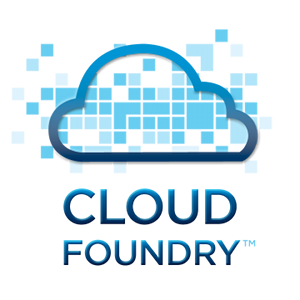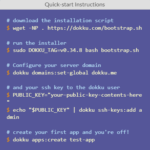
Obviously, the limit of what’s available is the biggest downfall for Heroku. We can only hope that Salesforce is putting resources into expanding Heroku to include Java, .NET, Python, C, C++, and all the other languages and stacks an enterprise would use. Heroku is a bit like the Apple of PaaS: It does one thing, and does it very, very well, but you won’t be hosting your trading applications there. For that, you might want to take a look at VMware.

Cloud Foundry has the best pedigree on this list, but it’s also a bit of a dark horse in the existing marketplace. That is, if VMware can get Cloud Foundry into shape.
The idea behind Cloud Foundry is great: host Java, Ruby and Node.js in a platform that can be run just about anywhere. Whereas Heroku is hosted in the cloud, Cloud Foundry is designed to run in your data center. As a result, your enterprise Spring applications can be migrated over to this modular platform, then spun up in any data center that needs them and runs Cloud Foundry. And with SpringSource behind the platform, you can be sure the Java stacks will be fast, lean and optimized for enterprises.
Of course, there are still doubts around the platform. It did come out of nowhere, with almost no warning from VMware. Previously, Cloud Foundry was just a name, but it was snatched up a few days before SpringSource was purchased by VMware. Rumors claim that Cloud Foundry pushed that acquisition over the edge and was the deciding factor for VMware to purchase SpringSource.
However, it’s been two years now, and Cloud Foundry still isn’t here in full. It’s almost as if VMware missed out entirely on Heroku, then turned around and decided to amend its existing plans to building a Heroku competitor. If Cloud Foundry and its MicroCloud desktop test deployment environment come to fruition, they could be quite useful and powerful. Keep an eye out for the final public release of MicroCloud later this summer, or give Cloud Foundry a try now by asking for an invite at its site.
#!

At first glance, CloudBees is all about Jenkins. You know, the Java continuous integrations suite that forked away from Hudson due to Oracle’s meddling? CloudBees is entirely about Jenkins, and that’s why it’s the single most developer-focused PaaS in this list. Instead of worrying about catchall administration and anti-Amazon pricing, CloudBees is about helping to make build and deploy as easy as possible.
Of course, once you move your code to the cloud and build it there, it only makes sense to just go ahead and host it there. Why build and test in one cloud, then deploy to another? With CloudBees, you don’t have to. If you’ve got a big Java application and it’s constantly evolving, CloudBees may be the best place for it to live.

All this focus on Java and Ruby in the cloud could make the .NET folk feel like they’re left out in the cold. But the .NET kids like to use the cool tools too. That’s why AppHarbor is based around rapidly building, testing and deploying .NET code. It’s so in-tune with the cool kids that it even offers a quick and easy way to push your code into AppHarbor from Git.
There’s a reason the slogan for AppHarbor is “Azure Done Right.” Instead of slowly pushing out stack additions and new tools over time, AppHarbor is fully focused on making the build and deploy time faster for developers, and thus enabling more agility for programmers working in Microsoft’s environments.

Out of all the platforms listed here, there is only one that is truly, top to bottom, getting it right. Dot Cloud was started at a Y Combinator company. That’s a startup funding and incubation group in the Valley that is very well known for producing hip, cool new companies founded by young, visionary developers.
The Dot Cloud way of doing things is not tied to any stack. The company is relentlessly focused on building out stacks for every situation. Once a Ruby on Rails stack was built, everyone could use it. The same goes for Java and Python. In the end, Dot Cloud’s goal is to allow developers to run anything, written in any language, using any stack. Instead of hording all the Ruby developers, or focusing exclusively on Java, Dot Cloud aims to be a platform you can run anywhere with anything inside. Naturally, this also includes management tools that will work just about anywhere as well.
Dot Cloud is by far the most interesting PaaS offering out there right now. It’s the one to watch, especially when it comes to its long-term plans.






